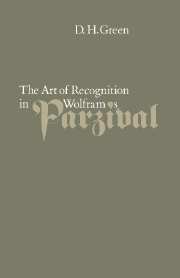Book contents
- Frontmatter
- Contents
- Preface
- Abbreviations
- 1 Possibilities
- 2 Gahmuret (Books I and II)
- 3 Parzival's youth (Books III and IV)
- 4 Parzival's failure (Books V and VI)
- 5 Gawan (Books VII–VIII and X–XIII)
- 6 Parzival and Trevrizent (Book IX)
- 7 Parzival's success (Books XIV–XVI)
- 8 Conclusions
- Appendix A The recognition of Parzival at Munsalvæsche and by Trevrizent
- Appendix B Trevrizent's ‘lie’
- Bibliography
- Index
- Frontmatter
- Contents
- Preface
- Abbreviations
- 1 Possibilities
- 2 Gahmuret (Books I and II)
- 3 Parzival's youth (Books III and IV)
- 4 Parzival's failure (Books V and VI)
- 5 Gawan (Books VII–VIII and X–XIII)
- 6 Parzival and Trevrizent (Book IX)
- 7 Parzival's success (Books XIV–XVI)
- 8 Conclusions
- Appendix A The recognition of Parzival at Munsalvæsche and by Trevrizent
- Appendix B Trevrizent's ‘lie’
- Bibliography
- Index
Summary
In the preceding chapters we have followed the course of Wolfram's narrative, looking at the problems of recognition in individual scenes and taking a broader view only when the narrative suggested this, as in Book IX, when the whole of the hero's past career comes under review. Now is the time to stand back from separate scenes ourselves and to assess the problems of recognition in Parzival under a number of wider headings, hitherto only implicit in our argument. These headings include realistic details which may account for success or failure in recognition; the possibilities of recognition; Parzival's gradual process of self-recognition; and the question of Parzival's naming. Although we may start with very pragmatic details, the argument of this concluding chapter will lead us to central problems of the work and thereby show us how close the theme of recognition stands to the poet's concerns.
Realistic details
We may start with those parts of a knight's equipment in the period immediately following 1200 which made it difficult or easy for a knight clad in armour to be identified. His chief protection lay in his knee-length chainmail armour, to which was added from the eleventh century a chainmail hood (härsnier), slipped over the head to protect it and the back of the neck.
- Type
- Chapter
- Information
- The Art of Recognition in Wolfram's 'Parzival' , pp. 264 - 319Publisher: Cambridge University PressPrint publication year: 1982



